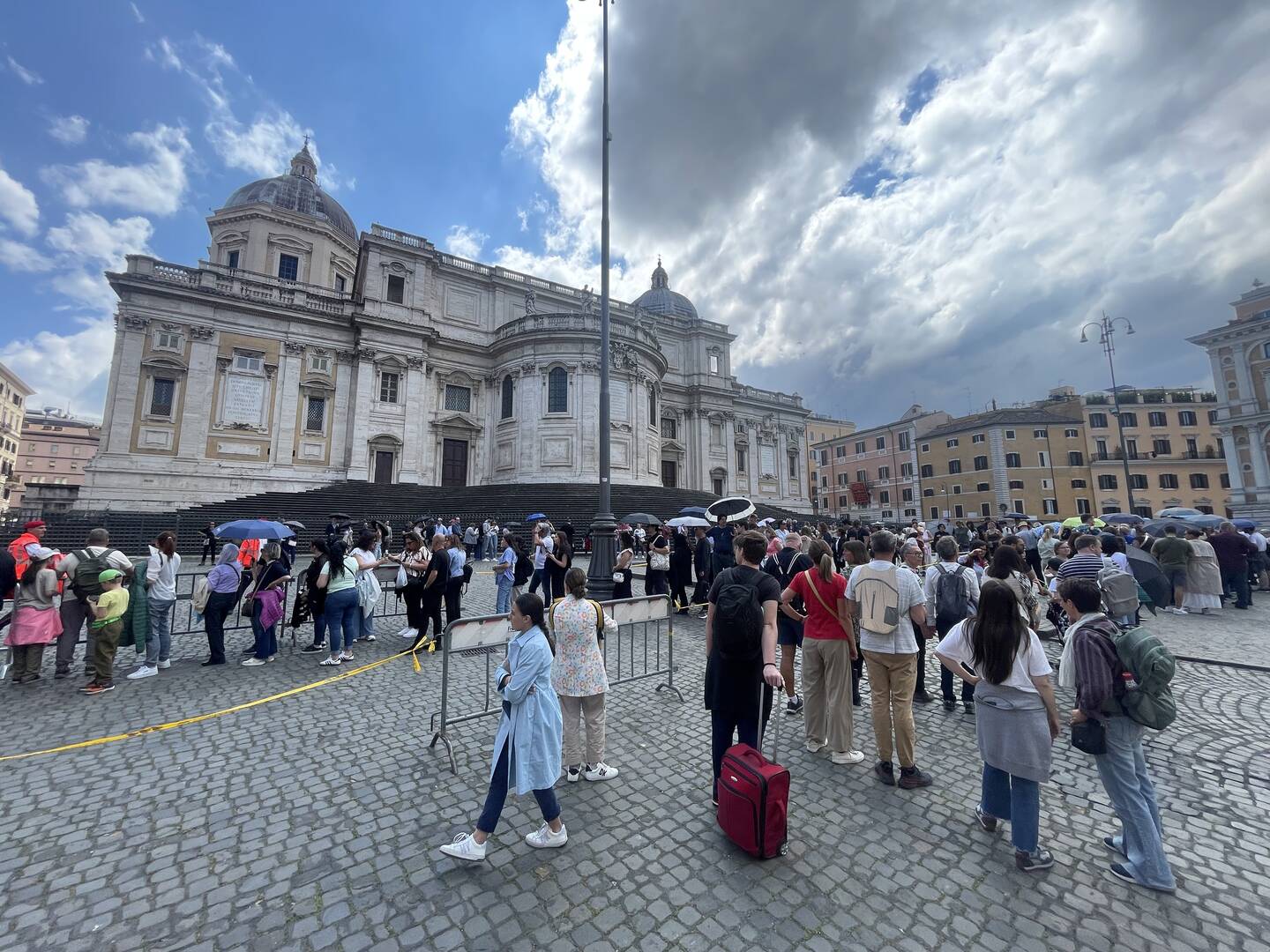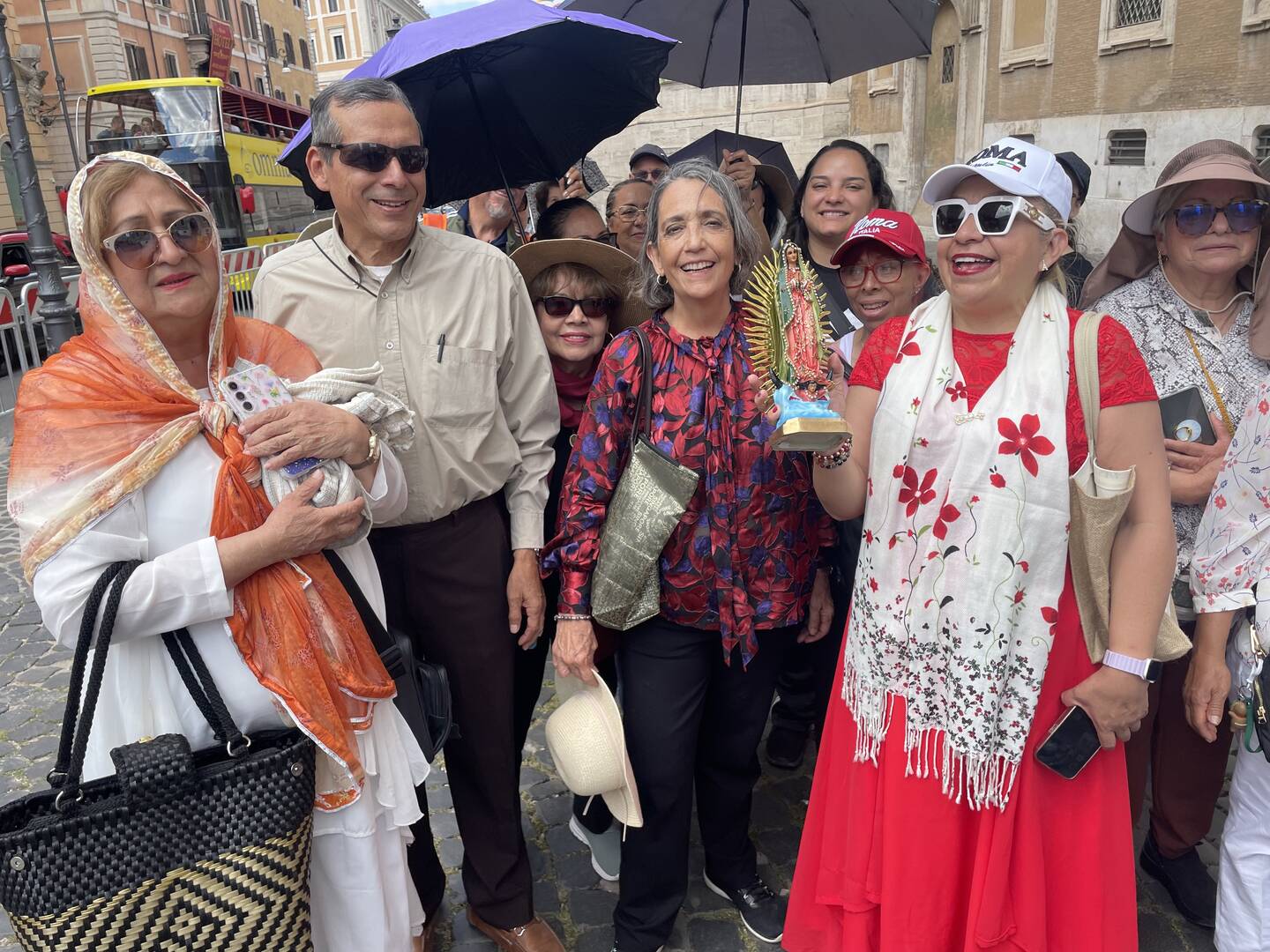Pope Francis, as specified in his final testament, was laid to rest in Rome’s Basilica of St. Mary Major in a tomb “in the earth; simple, without special decoration and with the only inscription: Francisus.”
Ever since, Catholics and non-Catholics from around the world have lined up to pay their respects to their beloved pope. Depending on the time of day, a security guard said, it could take hours or as little as 20 minutes to enter the basilica.
“Pope Francis has left a great legacy for the church and for us as priests,” the Rev. Halmar Adolis Calix, a priest from Honduras, told America in Spanish. One of the purposes of his trip to Rome was to visit the pope’s burial site.
“He has given a great witness of humility, of closeness to the people, of living out the Gospel values. He has left a great example for us to follow,” he said. “I believe the Holy Spirit always intervenes in the choosing of the next pope. And surely, the new pope will continue to give what the church needs in the circumstances in which we find ourselves.”
Pedro Barcelone, a 16-year-old who attends a Salesian-run school in Córdoba, Argentina, wanted to pay his respects to the first pope from his home country. He said Francis’ charisma helped him connect with young people.
His grandmother, Graciela Rios, stood next to him in line. Ms. Rios said visiting the tomb is a way to thank Pope Francis for all he did in his life.
“He was one of the few voices that stood up for the vulnerable, who spoke with sensitivity amid so much craziness, a voice for peace, a voice that was valiant and heard,” she said. “We have lost an Argentinian, but I believe he will continue to guide us.”

She hopes the next pope will follow in Francis’ footsteps and be a man who is humble but continues to reform the Catholic Church. “A flexible man who works for equality and justice,” Ms. Rios said in Spanish. “A man who will work for solidarity between people and between nations. That is what we are hoping for from the next pope.”
Ruth Nyakundi planned to celebrate her birthday by attending Saturday Vigil and Sunday Mass at the Vatican. She and her sister, Diana, came to Rome from Minnesota. It is their first time in Europe.
Ruth had been reading about him for years and wanted to see him on Easter. She admired Pope Francis’ ability to listen to many voices, build consensus and move forward.
“He’s been special to me,” she said of Pope Francis. “We’re not Catholic, but this is an interesting time for the Catholic Church. I’m curious to see what direction the church goes in.”
On Easter Sunday, Ruth saw Francis mostly through a big screen in St. Peter’s Square, but said it was quite emotional. “We knew he had been sick for a long time. It looked like a lot of effort on his part,” she said of Francis greeting the faithful on Easter Sunday.
Her sister, Diana, stood next to her in line. The pope’s visit to her home country, Kenya, meant a lot to her.
“He was able to identify with many people, from different backgrounds, especially the needy,” Diana said.
Further down the line, Anna Basquez waited to pay her respects with her friend, Patrick Dunne. Ms. Basquez is a Catholic journalist who covered Pope Francis’ visits to Dublin, Philadelphia, Juárez and Fátima.
She recalled feeling peaceful and serene while covering Francis’ canonization of two of the Fátima children in Portugal on the 100th anniversary of the apparitions. Ms. Basquez also described the emotional reception the people gave to Francis in Juárez, Mexico, just south of El Paso, Tex.
“He’s a pope of mercy, a pope for the poor,” she said. “I respected how he was so in tune with his community in Argentina and with humanity.”
Ms. Basquez noted how people of other faiths connected with the leader of the Catholic Church, including offering prayers for Pope Francis’ recovery while he was in the hospital. After she learned of the pope’s passing, she said she planned her trip to Rome from Denver, Colo., in 36 hours. Ms. Basquez encouraged her fellow Catholics to pray before the Blessed Sacrament for God’s will to be done in the conclave.
Mr. Dunne, who arrived from Dublin, Ireland, said he “came to a beautiful city, with a beautiful girl to pay his respects to a beautiful man who gave a damn, especially for the people who needed to be given a damn about.”
Mr. Dunne said the faith is still there in Ireland, but “it’s under a lot of shame, I suppose,” later explaining that evangelization is a matter of surfacing the Irish people’s deep-seated faith. He believes Pope Francis made progress reaching Irish Catholics during his papal visit to the country.
“Hopefully, the new pope will be able to take up where Francis left off,” Mr. Dunne said.

Not far behind him, a group of women on pilgrimage from Mexico waited patiently. They carried an image of Our Lady of Guadalupe and had been on pilgrimage in Europe for 20 days. They wanted to pay their respects to the pope before returning home.
“Pope Francis was a man who was close to the people, who was humble, who spoke to us about God’s mercy. That’s his legacy,” Teresa Uranga said in Spanish. Like Ms. Basquez, Ms. Uranga noted the pope’s poignant visit to Juárez, during which he called attention to the issue of migration.
“We pray for the cardinals,” Ms. Uranga said, “so that our Lord may give them light to pick the right person.”
Manny Touzard Guerra came from Seattle with his mother. He planned the trip a year ago for his mother’s birthday, and they had hoped to see Pope Francis. They next travel to Milan.
“My mom is Catholic,” he said. “She has a special connection with him, but I’m farther away from the faith. But Francis was a down-to-earth pope, I think, because he came from South America, like my mother.”
His mother, Rosa Guerra, immigrated to the United States from Peru.
“I have a lot of emotions,” she said, offering short sentences in Spanish. “I’m very sad. We arrived too late to see him. But we had to come here all the same. He did well. He was a humble pope.”
Still, she said, she would like the next pope to be like St. John Paul II, who she described simply as having broad appeal.
Near Ms. Guerra, João Beto Bettencourt and his brother, Igor, waited for their turn. They came to Rome from Brazil for the canonization of Blessed Carlo Acutis, which has been postponed. They attended Pope Francis’ funeral Mass and wanted to pay their respects at the pope’s tomb.
“He was a great man,” Mr. Bettencourt said. “He defended many causes, especially for the poor. He loved Brazil, and Brazil loved him.”







